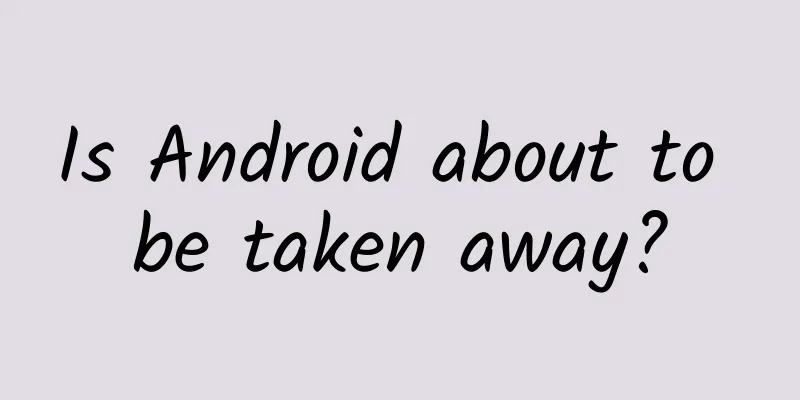Is Android about to be taken away?

|
When Cyanogen CEO Kirt McMaster announced that he wanted to take Android away from Google, it immediately attracted a lot of criticism and doubt. The reason for the criticism is that many Cyanogen users are also supporters of Google (some people flash third-party ROMs just to enjoy the original Android), and its corporatization is unsatisfactory; the reason for the doubt is that although removing Google services is feasible, it requires strong strength or a special market to achieve commercial success, so even the powerful Samsung does not dare to do so. Does it seem like Cyanogen's plan is just a ridiculous idea? After interviewing CEO Kirt McMaster, Fastcompany believes that Cyanogen's plan to take over Android may not be so ridiculous. First, Cyanogen reached an agreement with chip manufacturer Qualcomm to put the Cyanogen system into reference design phones. This means that phone manufacturers can obtain functions beyond native Android, such as themes and privacy controls, and Cyanogen is responsible for system upgrades. This is not enough to pose a threat to Google. However, as the number of users continues to increase, Cyanogen has the strength to replace Google services. Cyanogen's plan is to find alternatives to Google services and then deeply integrate them into the system. For example, replace the automatic backup service with Dropbox, or use Spotify as a built-in music software. In this way, when you ask the phone to play music, it will play Spotify instead of Google Play Music. "I can say to the phone, 'Play a song,' and then that song will play on the Sonos speaker in my bedroom, using Spotify," McMaster said. In addition, Cyanogen will cooperate with some small companies, such as companies that develop virtual assistant software. Their services may be superior, but they can't compete with Google Now, because Google Now is a system-level integration. In addition to system-level services, Cyanogen will also provide its own software store. Unlike Google Play, Cyanogen may provide multiple application stores from different providers. He said that China has a variety of application stores, some of which provide professional software. This model is also feasible in other countries. Even so, it's still difficult to build an ecosystem that can compete with Google. So Cyanogen hopes that it won't completely cut ties with Google. "As a company, we like Google. We like Google's services. I use Google services every day," McMaster said. "We want to work with Google. As for whether they want to work with Cyanogen, it depends on their willingness." "That was more of a rallying cry that we desperately need an open Android and an open computing platform," McMaster said of the talk of taking over Android. "We're not naive enough to think that we can take over Android and have 500 million users." "We want people to have an open choice, and that's what we fight for. Believe me, it's a fight. So we're not going to sit back like kittens and play with this," he said. "We're going to be aggressive." |
<<: Smart hardware industry leaders give in-depth analysis of Apple Watch
>>: [Powerful] D3.js visualizes the number of SSH brute force attacks
Recommend
In order to let aliens understand the earth's information, they desperately came up with these "garbled codes"
Recently, the U.S. Congress held a public hearing...
Tangmao M2 experience: 4G+Wi-Fi video calls are more practical than Apple Watch
This year, the third-generation Apple Watch suppo...
Frequently asked questions about paid promotion in Huawei AppGallery!
Paid Marketing FAQ 1. FAQ about paid promotion Q1...
He was proficient in everything from philosophy to aerospace, and he spoke up for "Beidou" at the last moment of his life!
He is One of the four advocates of the famous &qu...
More than a decade ago, Korean films also experienced the same kind of capital madness in China today.
"Now all kinds of capital, including real es...
The latest global cumulative confirmed cases of new coronavirus pneumonia, the global cumulative confirmed cases of new coronavirus pneumonia have exceeded 3.4 million!
Real-time statistics released by Johns Hopkins Un...
How do luxury brands use UGC marketing? Key analysis of these 3 issues
Many luxury brands are reluctant to use user-gene...
"See through" the brain! Chinese scientists "new" super microscope
Author: Shi Xiangqi and Li Chuanfu Imagine that w...
Where did Gou Jian, who slept on firewood and tasted gall, live? The capital of Yue State has been discovered!
On November 15, the latest archaeological discove...
How will Apple support the future of its five major OS?
At 10:00 a.m. Pacific Time on June 3, 2019, at th...
Which "anti-human" designs in life are actually very scientific?
appendix: References: Source: A scholar The cover...
Chinese oryx on the shore of Qinghai Lake
Chinese oryx on the shore of Qinghai Lake Zhao Ji...
100 universal article titles, a must-have for new media editors!
Many new media people don’t know what kind of tit...
Ditch the PC? Why did you spend $14,000 on a new MacBook Pro?
The professional-oriented MacBook Pro received it...
BYD's sales of new energy passenger vehicles hit a record high in June, ending the first half of the year with a perfect ending
Official data shows that BYD sold 49,765 passenge...









